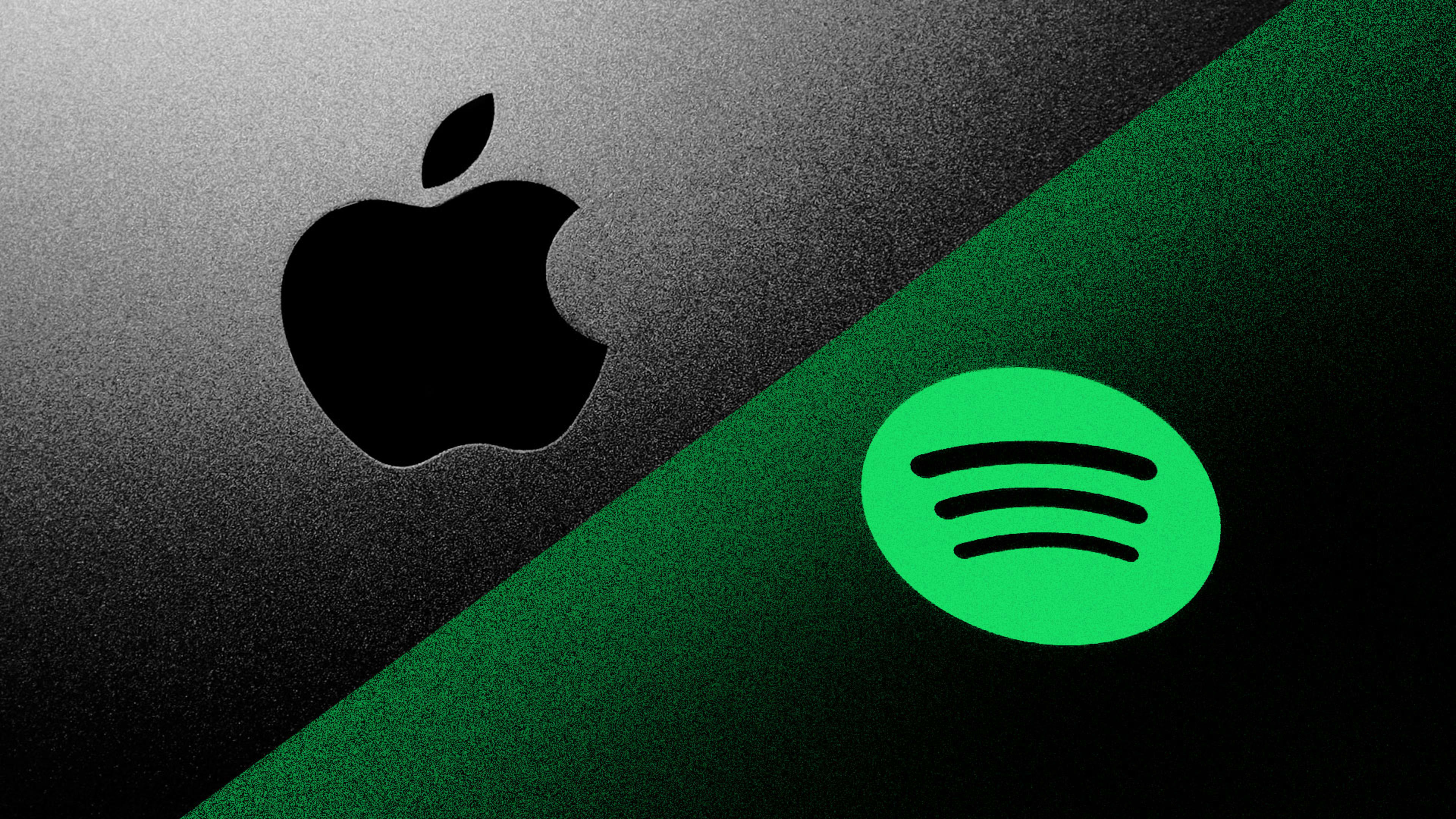Apple was slapped Monday with a $2 billion antitrust fine by the European Commission over claims that it’s giving Apple Music an unfair advantage over music-streaming rivals—specifically, Spotify.
The landmark penalty, which is the first-ever levied against the California tech giant by the European Commission, and which represents a figure four times higher than insiders predicted, was the culmination of a probe that began in 2019 after Spotify formally accused Apple of using its App Store to hamstring competition. Apple’s fine is for “abusing its dominant position” over music-streaming-app distribution (via the App Store) to keep users from learning about alternative, cheaper music services.
The fine marks a major win for Spotify and could go on to upend the relationship that app developers in other industries have with Apple. But at least for today, the drama is playing out in the form of two publicly traded, multibillion-dollar tech companies that dominate their industries slinging the maximum amount of mud at one other in dueling press releases.
Spotify’s begins with the phrase “Time to play fair” (the umbrella theme for these antitrust complaints, which Spotify has parked under TimeToPlayFair.com), calling the fine “an important moment in the fight for a more open internet” and arguing that it sends “a powerful message—no company, not even a monopoly like Apple, can wield power abusively to control how other companies interact with their customers.”
Spotify’s initial complaint stemmed from the cut of revenue Apple takes from users’ in-app purchases (the notorious 30% “Apple tax”). The EU’s new Digital Markets Act (DMA) will block Apple from collecting this commission that’s became a sort of bane of app developers both small and large, including Meta.
But while developers were hunting for end-arounds, Spotify complained that Apple had created additional harmful policies that allowed the App Store to prevent competitors, such as Spotify, from directly communicating with users about promotions, perks, deals, discounts, or other ways to upgrade their service. As Spotify’s statement on Monday made sure to note: “Of course, Apple Music, a competitor to these apps, is not barred from the same behavior.”
The Commission claims its investigation confirmed that Apple bans music-streaming app developers “from fully informing iOS users about alternative and cheaper music subscription services available outside of the app,” and also “from providing any instructions about how to subscribe to such offers.” This conduct “may have led many iOS users to pay significantly higher prices” for “almost 10 years,” it wrote.
Spotify is claiming Apple uses compliance with App Store rules “as a pretext to block” certain kinds of app updates, “making it challenging, and in some cases impossible, to bring you our latest and greatest innovations.” TimeToPlayFair.com gives some examples: “That deal we had for you last month to upgrade to our Premium service that would have saved your family a lot of money? Sorry, there was little we could tell you about it. We aren’t even allowed to tell you something as simple as how and where to upgrade to Premium via the app.”
Apple, meanwhile, spent today arguing that a very different set of events are what led to its historic penalty: Spotify, owner of “the largest music-streaming app in the world,” and the Commission have “coordinated” by meeting “more than 65 times” since the year 2015 to help the European Commission craft an investigation “with little grounding in reality.”
Apple notes that the Spotify app has been downloaded some 119 billion times onto its various devices, and is currently available on the App Store in 160-plus countries. “Despite that success, and the App Store’s role in making it possible, Spotify pays Apple nothing,” the company gripes. “That’s because Spotify—like many developers on the App Store—made a choice. Instead of selling subscriptions in their app, they sell them on their website. And Apple doesn’t collect a commission on those purchases.”
Spotify pays nothing, but the reason is a bit more complicated than what Apple is arguing. Starting in 2016 and lasting until 2023, Spotify asked subscribers to switch out Apple’s in-app payment system for an alternative method of their choice (a credit card, PayPal). In 2023, any remaining legacy Premium subscribers were moved over to an ad-supported free membership that now circumvented Apple’s platform.
Apple likely wasn’t a fan of that, but it believes Spotify got even greedier when it complained to the European Commission. “Free isn’t enough for Spotify,” its statement says. “They also want to rewrite the rules of the App Store—in a way that advantages them even more.”
Apple is appealing the EC’s ruling, maintaining it’s an attempt to punish the company for violating the DMA before it formally comes into force. Apple has fought the EU’s DMA at every step, but today writes: “Apple is set to comply with the DMA in days, and our plans include changes to the rules challenged here.” (The release didn’t detail those changes. The DMA goes into effect on March 7, technically leaving Apple little option but to be “set to comply.”) It’s still battling various provisions of that law in court, however.
What “isn’t enough” for Spotify, in the meantime, is apparently the EC’s ruling. “Apple has routinely defied laws and court decisions in other markets,” it claims. “While we are pleased that this case delivers some justice, it does not solve Apple’s bad behavior towards developers beyond music streaming in other markets around the world.”
“Our work will not be done,” it adds, seemingly taunting Apple, “until we succeed in securing a truly fair digital marketplace everywhere, and our commitment to helping to make this a reality remains unwavering.”
Recognize your brand’s excellence by applying to this year’s Brands That Matter Awards before the final deadline, June 7.
Sign up for Brands That Matter notifications here.
